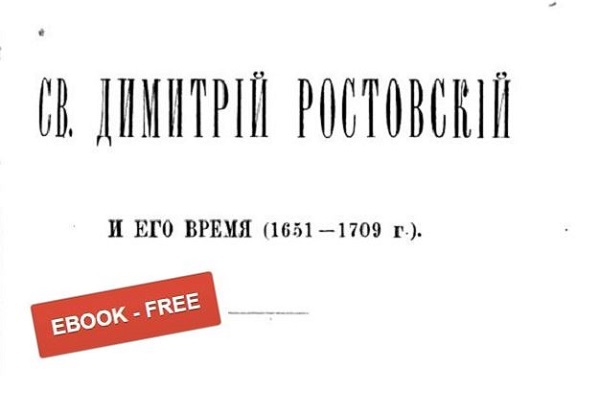University Libraries

A Tale of Interlibrary Loan Sleuthing
By Chris Tangeman
As the University Libraries’ interlibrary loan borrowing specialist and the humble servant of Roesch Library patrons of all sorts, I see thousands of ILL requests come across my desk every year, and the vast majority of them are fairly routine and dealt with pretty quickly. But every once in a while I receive a request for some items that are a little more challenging (and fun). Please allow me the opportunity to relay the details of my most recent ILL-sleuthing triumph and to acknowledge the positive benefits of Wikipedia usage, all while patting myself on the back.
A doctoral student submitted an ILL request for what appeared to be a French book from 1891 called Saint Dmitri de Rostov et son temps, by “Chliapkine.” No problem. Fairly standard. But no! The requested information turned up no hits — none in our UD catalog; none in OCLC’s WorldCat (an online union catalog of over 400 million records in 491 languages); none in our databases; and none in Google. Dead end.
Another clue: An old citation
But no! Look down there! The student provided some information in the “Cited in:” field of the ILL request. Perhaps that citation would lead to some clue that was not relayed through the ILL request. The mystery book was cited in a French book from 1952. Lo and behold! We own it. I went to the Marian Library’s collections, found the 1952 book and located the footnote in question, and … it matched what had been supplied in the ILL request, letter for letter. No additional information would be found in that book. Dead end.
At least the doctoral student agreed with me that this was probably just a French citation for a work that was actually in Russian. Better yet, the student preferred a book in Russian. So I went back to my WorldCat and Google searches, determined to find out more about this author, this “Chliapkine.” I could find nothing. There were two close items in the WorldCat results where an “I. A. Chliapkine” was listed as the second author, but these were not the correct books. And I wasn’t finding anything helpful in the Google results.
Don't knock it: Wikipedia yields a lead
So I went to that often maligned resource: Wikipedia. I hoped to figure out who “Saint Dmitri de Rostov” was. Perhaps there would be some clues there. There was nothing under “Saint Dmitri de Rostov.” Nothing under “Dmitri de Rostov.” Somehow, through something I had seen in a Google result, I decided to try “Dmitri Rostovsky.”
There it was. A Wikipedia page for “Dimitry of Rostov,” redirected from Dmitry Rostovsky. From that page, I clicked on "Русский" to get to the Russian Wikipedia page, and through the marvels of modern science, my computer offered a translation of the Russian page back into English — free of charge! Accept!
Somewhere on that double-translated page, I found a citation listing the philologist, paleographer, and historian of ancient Russian art, Ilya Aleksandrovich Shlyapkin. Now we’re on to something!
Another try in WorldCat: Getting warmer
A WorldCat search under that author’s name turned up 20 book results, and No. 16 was titled “Св. Димитрій Ростовскій и его время, 1651-1709 г., etc.” by “Il’ya Aleksandrovich SHLYAPKIN.” I went back to the Wikipedia page and saw that “Св. Димитрій Ростовскій” did indeed translate to “St. Dimitri Rostovsky.” We found it … but it’s only available in the British Library’s Reference Collection, and they do not lend out those items to the United States. Boo.
Jackpot!
The student seemed happy that I had figured it out … but I was not satisfied. I went back to Google and searched for “Св. Димитрій Ростовскій и его время, 1651-1709” there. And there it was. Not only was the book digitized and available through the good folks at Google, but the words “EBOOK – FREE” were there in the corner. I was finally able to relax. The job was near enough to done.
All in a day's work
When all was said and done, and I had provided this scholar with a link to the information sought, I looked around. I had no one to high five. All that greeted me in my library-appropriate subdued state of euphoria was a queue of more requests. So back into the ILL trenches I went, quietly fulfilled that I'd justified the more glamorous title George Washington University interlibrary loan manager Tara Patterson has assigned to our field of work: "forensic bibliographic reconstruction."
— Chris Tangeman is the interlibrary loan borrowing specialist in Roesch Library
